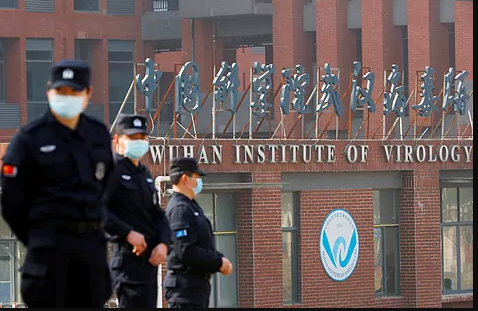The decision comes in a context where the theory of a laboratory accident in Wuhan, China, has regained traction in the debate in the United States, after being long dismissed by most experts.
Facebook will stop banning the publication of theories that claim that covid-19 emerged from a laboratory amid renewed debate in the United States about the origins of the virus, raising new doubts about the role of social networks in the verification of information .
“In light of current investigations into the origins of COVID-19 and in consultation with health experts, we will no longer remove from our platforms claims that COVID-19 was man-made or manufactured, ” the group said, who also owns Instagram, on his website on Wednesday.
The latest movement of the social network, used by some 3.45 billion people on at least one of its four platforms (Facebook, Instagram, Messenger, WhatsApp) contradicts its previous rules on false information in times of covid-19, updated in February .
Months ago, Facebook included the banning of theories that suggested a human creation behind the virus, as well as the alleged ineffectiveness of the anticovid vaccines or that they could be toxic or dangerous.
“We continue to work with experts to monitor the evolving nature of the pandemic and regularly update our policies as new facts and trends emerge,” Facebook stated.
The decision comes against a background in which the theory of a laboratory accident in Wuhan, China, has regained traction in the debate in the United States, after being long dismissed by most experts. And calls for further research are multiplying in the scientific community.
US President Joe Biden on Wednesday asked his intelligence agencies to “redouble their efforts” to explain the origin of the coronavirus and demanded a report within 90 days.
The natural origin hypothesis holds that the virus arose in bats and then passed to humans, probably through an intermediate species.
This theory was widely accepted at the beginning of the pandemic, but scientists have not found a virus in bats or another animal that matches SARS-CoV-2.
Meanwhile, the theory of the laboratory leak is gaining strength, after being initially promoted by former President Donald Trump and his entourage, and later dismissed as a political argument.
Days ago, The Wall Street Journal newspaper accessed unpublished US intelligence information, pointing out that three researchers from the Wuhan Institute of Virology -China, where covid-19 was detected- had already suffered symptoms compatible with the virus in November 2019. virus. That is, a month before Beijing reported an outbreak of a rare pneumonia. Later, the virus spread around the world, killing nearly 3.5 million people.
“UNSUSTAINABLE” MODERATION
Facebook’s move highlights controversy over social media efforts to root out misinformation on dynamic topics.
The reversal may be “another sign of the possibility of a change against harsher moderation,” tweeted Evelyn Douek, a Harvard University professor and researcher on the regulation of online speech. “When the pandemic started, there were a lot of arguments that ‘what platforms are doing for health misinformation, they should be doing for all misinformation all the time.’
Facebook uses third-party independent fact-checkers to debunk misinformation.
Although the origins of the virus remain unproven, the theory of the laboratory leak has been verified. The fact- checking organization PolitiFact noted last September that public health authorities had repeatedly said that the coronavirus did not originate in a laboratory.
Indeed, following a visit to Wuhan earlier this year, a joint study by the World Health Organization (WHO) and Chinese experts deemed a laboratory accident “extremely unlikely.” But the United States and 13 allied countries later expressed “concern” in a joint statement, demanding that China provide “full access” to their data. PolitiFact’s verification was reviewed this month: “That claim is now more widely disputed,” he said.
Facebook’s backtracking drew backlash from conservatives and Trump supporters.
“Wow! But they did suppress the story for a year, smearing Trump and Republicans for a ‘conspiracy theory’ that blacklishes the conservative press and outlaws us,” tweeted Kelly Sadler, blogger and former assistant to Trump.
However, Rebekah Tromble , director of the George Washington University Institute for Data, Democracy and Politics, said Facebook “is doing the right thing.”
“Information changes over time, and responsible organizations, both social media and fact-checkers, make decisions based on the best information available, but remain open and willing to change their assessments as new information emerges.” , he pointed.
Separately, Facebook said it was stepping up its efforts against misinformation by limiting users who “repeatedly” share bogus content.
